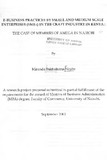| dc.description.abstract | The focus of this study was to determine the extent to which the Internet is being used for
e-Business practices by the craft industry in Kenya. The study also looked at the factors
influencing the use of the Internet by some members of AMEGA who are already in the
craft export business.
The need for this study arose from the fact that the rapid pace of technological
developments has changed the way businesses operate. Of significant impact is the
adoption and utilization of the Internet as a medium for communication and e-business.
An increasing number of SMEs in Africa are using the Internet for a variety of functions
including e-mail as a means of communicating with their clients. With the increased
number of ISP activity in Kenya, with 18 registered in Nairobi alone according to
Mbayah, 2000, more and more SMEs are seen to be taking up internet and e-mail
services from these ISP's to conduct their business electronically. There is therefore an
expected increase in the use of the Internet as a medium for conducting e-business by the
SME sector, which influenced the research question for this project.
AMEGA was chosen as the focus of study as it consists of exporters of craft products to
various overseas destinations. 55% of the respondents were found to have had more than
6 years of experience in exporting crafts, which made them an ideal study population for
purposes of this research. An analysis of their current practices inclusive of Internet usage
was thus done in this study.
The overall results revealed that 90% of the craft exporters interviewed were using the
Internet through e-mail or web site technology to communicate with their clients. Also
100% of clients as revealed by the respondents prefer to use e-mail for business
communication. From the respondent group itself, 95% indicated they also preferred email
as opposed to the traditional fax. Therefore the exporters are being coerced into
adopting the same technology as their clients.
With 55% of the respondents exporting between 41 and 80% of their products, it was
concluded that the core business of these AMEGA members is export oriented. However,
it was fund that only 35% of total respondents received sales orders by e-mail. This was
attributed to the small number (25%) of exporters with websites for displaying their
products and thus invoking e-mail enquiries and orders. Therefore with more Internet
activity and usage by the exporters through websites, there is potential to increase volume
of business coming through form craft exports.
Conclusions drawn were that should more exporters of craft take up the Internet as a
mode of displaying their wares and electronically trading, the volume of exports sales is
likely to increase. The members of AMEGA should therefore consider adopting the
Internet as a medium of conducting business. The two channels of accessing the Internet,the ISP's and Cyber cafes are well represented in Nairobi to allow for a faster uptake of
Internet technology.
Though conclusions reached were general and tentative, overall they appear to suggest
that the use of the Internet could open more markets to an unlimited audience with no
time constraints (24 hr businesses). This may have the positive effects of increasing
export sales revenue for the country, complementing other revenue earners like flowers,
tea and coffee exports. In the development equation, this is an avenue that can be
harnessed for poverty alleviation and wealth creation for the unemployed and
underprivileged. Further more, women were identified as the main players in this industry
therefore this could bring women to the fore of development and elevate their status as
contributors to economic development.
There is indeed scope for further research in this area as the Internet is a technology that
will be in existence in the long run. An interesting study would be to look at the extent of
the impacts on the actual consideration and failure to consider the Internet as a new way
of conducting business communication. The dynamic nature of the Internet means
businesses will be forced to continue deploying internet technologies strategically
therefore research in strategic deployment of the Internet would be another area of study.
Yet another possible study would be to look at the relationship between demographic
factors in developing countries and speed of uptake of the Internet. This would facilitate
deployment of Internet technologies and identify sectors requiring capacity building and
further training. | en |

